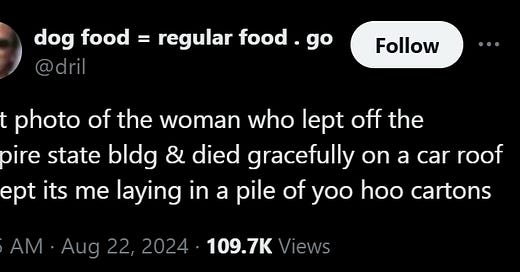Why typographic humor doesn't age well
One of online's most interesting forms of comedy has an unbearably short shelf life.
Back in 2015, the small faction of Twitter users I spent my time chatting with suddenly fell into the habit of talking about “true gamers.” The joke was that at the time, video game writing often made a weirdly insecure and self-aggrandizing distinction between true gamers and poseurs, so it was funny to carry that into unrelated contexts. True gamers d…
Keep reading with a 7-day free trial
Subscribe to Carl Beijer to keep reading this post and get 7 days of free access to the full post archives.




